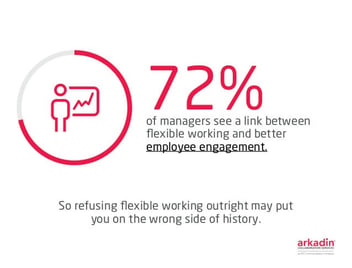Five steps to making a flexible working hours request – when you’re already in a role
If you’re in a current job but you’d like to request flexible working hours, what should you do? Well, there’s a set procedure outlined by ACAS that both you and your employer must adhere to when making a statutory flexible working request.
We look at what you can do to ask for flexible working if you’re already in a full-time professional role.
1. Check the policy
Look at what your company’s flexible working policy says about how requests should be made. It might be easier to make an informal request before moving to a statutory request.
2. Know what you want
There are lots of ways flexible working hours can be packaged – from staggered hours to 9-day fortnights. See our list of flexible working patterns here and have a think about what it is you really want.
3. Expect a meeting to discuss it
An employer will likely request to talk through your flexible working request, although not always. This process needs to be completed within three months of the request being initially made. You can bring a work colleague to the meeting if you wish.
4. Set it out in writing
Follow the guidelines, date it and format it. Set out what you want and when you want it to come into effect. Add how you think this will affect the existing business and how, in your opinion, this might be dealt with.
You can only make a request for flexible working twice every 12 months, so it’s important to get it right. Remember to provide solutions and benefits rather than present your employer with problems.
An employer will likely request to talk through your flexible working request, although not always. This process needs to be completed within two months of the request being initially made (including any appeal process). You can bring a work colleague to the meeting if you so wish.
5. Prepare to be flexible
Your flexible working request will likely be met by one of three outcomes:
- Your employer accepts the request and confirms a start date.
- Your employer suggests a compromise, so instead of, say, Monday to Wednesday, they might prefer you to do Wednesday to Friday instead.
- Your employer rejects the request, setting out clear business reasons for doing so. You can appeal this and you should be offered a meeting if you feel the application wasn’t handled responsibly.
Deborah O’Sullivan, Managing Director at Ten2Two says, “It’s traditionally viewed as simpler to ask for flexible working once you’re already in a role. Many employers are now realising that flexible working is becoming accepted as a standard work practice, and an important employee retention tool. It’s also an important employee benefit for businesses seeking to attract new talent as the skills gap squeeze begins to bite.”
If you’d like to find a flexible professional career role, help is at hand. Our flexible and part-time recruitment agency provides flexible staff for companies across the south of England. Register to be a candidate (or Member as we like to say) via our website.
We look forward to hearing from you.


 Back to resources
Back to resources 3 min read
3 min read








